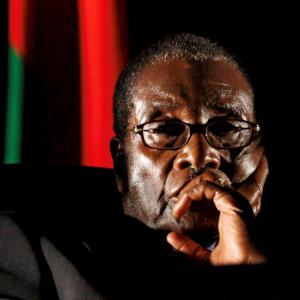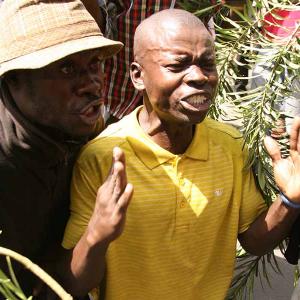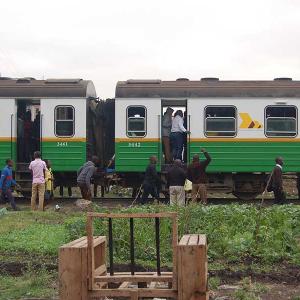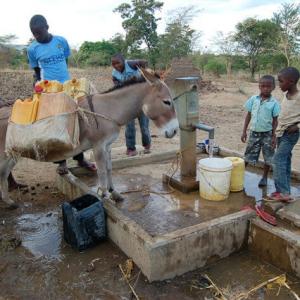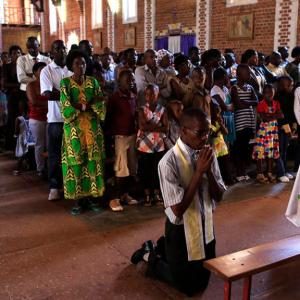Fredrick Nzwili is a journalist based in Nairobi, Kenya. For more than 15 years, he has written about religion, politics, peace and conflict, development, security, environment and wildlife. His articles have appeared in international media organizations among others; The Tablet, The Christian Science Monitor, The National Geographic and Kenyan local newspapers; The Standard and the People Daily.
Posts By This Author
‘Black Panther’ Inspires Kenyan Church Leaders to March for Pan-African Unity
“I think it’s important that we do not let the interest in Black Panther go without harnessing that moment to transform it from just a cultural movement into a sustained movement,” he said.
Rwanda Closes Hundreds of Churches and Arrests Pastors
David Himbara, a Rwandan international development advocate based in Canada, called the government’s justification for the closures bogus and said the “real reason … is fear and paranoia.”
Interfaith Film Misses Oscar, but Raises Hope in Africa
The Academy Award nomination was a cause for celebration throughout the country. President Uhuru Kenyatta tweeted after the 90th Oscars ceremony in Los Angeles on March 4: “You have won our hearts as a nation … Keep telling our stories through your camera and you will win next time.”
In Kenya, an HIV-Positive Pastor and His Wife Model New Thinking About AIDS
AIDS killed his wife in 2013, and his 13-year-old daughter the next year. And when his flock found out that Mutuse himself tested positive for HIV, the virus that causes AIDS, many abandoned him — and some thought his diagnosis justified the burning of his church.
A Catholic Priest Is Mediating Mugabe’s Departure
The priest first met Mugabe, a Catholic in an overwhelmingly Protestant country, in 1974 at a Jesuit social service agency outside the nation’s capital, Harare, where Mugabe’s sister worked.
Kenyan Religious Leaders Concerned by 'Bible Heroes' Tone of Presidential Race
"They want their supporters to believe this is a divine call, which is not. I think they are manipulating their supporters," said the Rev. Wilybard Lagho, the Mombasa Roman Catholic archdiocese vicar general.
Commuting to Nairobi, the Train Becomes a Church
Starting in the suburb of Ruiru, about 19 miles north of Nairobi, the train for the past five years has informally hosted a growing number of self-styled pastors and a makeshift, moving congregation eager to hear the gospel.
At least two coaches turn into “churches” each day, with Christians singing, dancing, and clapping as they prepare for a short sermon during the one-hour journey.
Christian Groups Respond to Growing Sudanese Refugee Crisis
“This is a fast-growing humanitarian situation which we have never seen before,” said Benson Okabo, World Vision’s West Nile Refugee Response operations manager. “We are concerned that the donor assistance has been little.”
On World Water Day, African Church Leaders Highlight Shortages
The drought in the Sahel — a region that forms a dry belt across northern Africa — has left millions without any water to drink, and is being linked to three deaths in recent days in Kenya, due to consumption of unsafe water.
“There are no drops to reduce, recycle, or reuse,” said professor Jesse Mugambi, of the University of Nairobi, who added that many in the region are spending World Water Day “praying for drops of rain to quench their thirst and that of their livestock.”
In Kenya, a Pastor Fights Against Female Genital Mutilation
Clutching a Bible in one hand and a walking stick in the other, Pastor Stephen Lenku Tipatet traverses the plains of Kajiado County, fighting female circumcision and propounding on the Christian gospel.
The region is the homeland of the Maasai, an indigenous community in Southern Kenya and northern Tanzania. The community has resisted modernity and Western influences, and clings to their traditional way of life, including the practice of female genital mutilation, or FGM.
Rwandan Bishops Apologize for Role in 1994 Genocide
Roman Catholic bishops in Rwanda have issued an apology for the role played by individual clergy and church members, in the 1994 genocide in which nearly 1 million ethnic Tutsis and Hutus were killed.
On Nov. 20, the apology was read aloud in all Catholic churches, in the local Kinyarwanda dialect. It came at the end of Pope Francis’ Jubilee Year of Mercy.
Anglican Priest in Kenya Joins Lawsuit Demanding Greater Rights for Gays
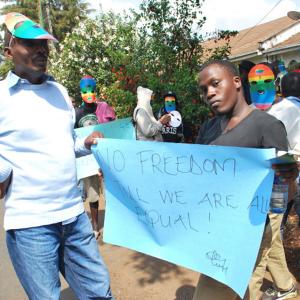
Image via Fredrick Nzwili / RNS
An Anglican priest has joined two gay men and two lesbians in a suit against the state over discriminatory laws that they see as encroaching on the rights and freedoms of sexual minorities in the East African country.
The Rev. Mark Odhiambo and the other plaintiffs charge that gays and lesbians in Kenya are routinely attacked, raped, evicted from their homes, and arbitrarily arrested. Odhiambo is a curate, or assistant to the parish priest, in Maseno South, a diocese on the shores of Lake Victoria.
Desmond Tutu's Daughter Quits Priesthood After Marrying a Woman
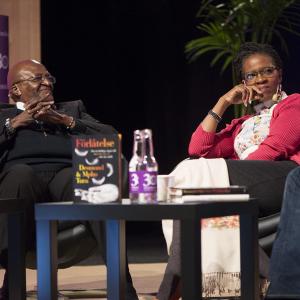
Desmond Tutu with Mpho Tutu. Image via REUTERS/Fredrik Sandberg/TT/RNS
The daughter of Nobel laureate Archbishop Emeritus Desmond Tutu of South Africa has given up her clergy credentials after marrying a Dutch woman.
The Rev. Mpho Tutu told the local media that since her church did not recognize her wedding, she could no longer serve in the country.
Kenyan Anglicans Elect New Archbishop
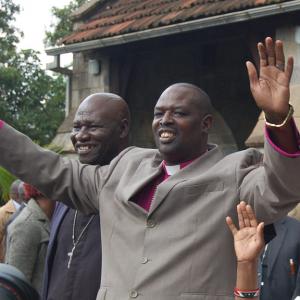
Archbishop-elect Jackson Nasoore Ole Sapit. Image via Fredrick Nzwili / RNS
Bishop Jackson Nasoore Ole Sapit, a traditionalist who nonetheless steered clear of gay issues, has been elected the new archbishop of Kenya.
Ole Sapit, 52, who headed Kericho Diocese in western Kenya, will replace outgoing Archbishop Eliud Wabukala and also serve as bishop of All Saints Cathedral, the national seat of the Anglican Church.
Nigerian Cardinal Escapes Injury as Attacks on Clergy Mount
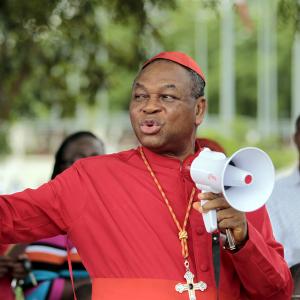
Cardinal John Onaiyekan. Image via REUTERS/Afolabi Sotunde/RNS
The lives of clergy are known to be difficult, but in Nigeria they are often dangerous, too.
Last week, gunmen shot at a car carrying Roman Catholic Cardinal John Onaiyekan in the country’s southern Edo state. The cardinal was returning home after attending the 10th anniversary celebrations for the Uromi Diocese. He was unharmed.
Catholic Bishops in Burundi Call for Democracy, Government Calls Them Terrorists
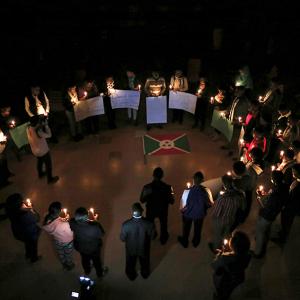
Kenyan students in Burundian solidarity vigil. Image via REUTERS/Noor Khamis/RNS
A serious breakdown between the powerful Roman Catholic Church and the government in Burundi is raising concerns over stability in the East African nation, as senior government officials accuse the church of sponsoring violence. Since April 2015, the country has been racked by chaos after President Pierre Nkurunziza agreed to run for a third term. Catholic bishops had strongly opposed the move, saying the constitution was clear that a president should serve only two terms.
Kenyan Priest Denounces Killing of Two Legendary Lions
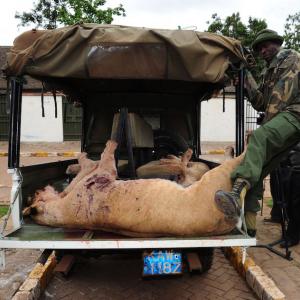
Image via Fredrick Nzwili / RNS
A Catholic priest has denounced the killings of two legendary lions, one violently speared by a Maasai warrior, outside the city’s famous national park. Lions and other wildlife roam freely in the wild in the 45 square-mile Nairobi National Park. A popular tourist destination, the park is only a short drive from the central business district and has earned Nairobi the distinction of the world’s wildlife capital.
Hope and Frustration Mark Anniversary of Boko Haram Kidnappings
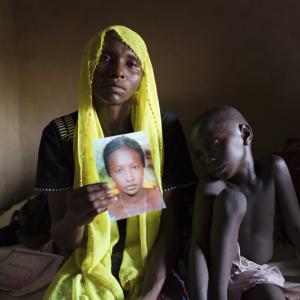
Image via REUTERS/Joe Penney/RNS
Two years after the abduction of nearly 300 Chibok schoolgirls by Boko Haram militants in northeast Nigeria, some parents are still hoping their daughters will one day be rescued. But some church leaders there are concerned that the authorities have not done enough to rescue the girls, who were ages 16 to 18 at the time of the kidnapping on April 14, 2014. About 50 of the girls escaped, but 219 remain missing.
Kenyan Program Recruits Faith Healers to Help Identify Mentally Ill
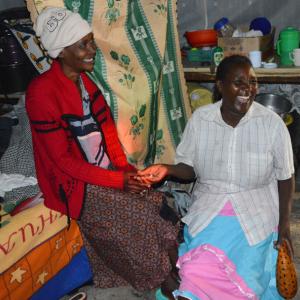
Image via Fredrick Nzwili / RNS
Across Africa, many people believe mental illness is caused by curses, witchcraft, or demons. In such places, traditional medicine has long remained the first line of treatment. But a novel program in Eastern Kenya is working to change those perceptions and help the mentally ill receive better care.
Drought in Africa Adds Pressure to Religious Groups, Relief Organizations

Image via Fredrick Nzwili / RNS
Churches in eastern and southern Africa are appealing for humanitarian aid in the region, as 36 million people grapple with the worst drought in decades. Linked to extreme El Nino weather conditions, the drought has hit countries such as Somalia, Ethiopia, Kenya, South Sudan, Malawi, and Zimbabwe, among others. The conditions have reversed normal weather patterns, upsetting people’s livelihoods.




